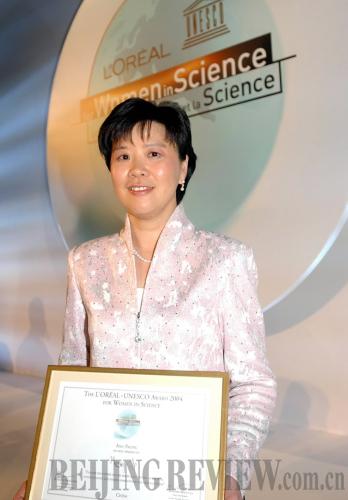|
 |
|
L'ORÉAL GLORY: Nancy Yuk-Yu Ip receives the L'Oréal-UNESCO Award for Women in Science in Paris, the headquarters of UNESCO, on March 12, 2004 (XINHUA) |
When Charles Kuen Kao, former president of the Chinese University of Hong Kong and pioneer of fiber optic telecommunications, was bestowed with a Nobel Prize in physics at the age of 76 in 2009, he could scarcely recall the details of the fiber optics technology he had helped develop. The outstanding China-born scientist was suffering from Alzheimer's disease (AD), the most common form of dementia.
Today, AD has become a serious health issue for people over 65 years old globally, afflicting 10 million in China and rising by 300,000 annually. As the aging population grows, AD is predicted to affect 1 in 85 people globally by 2050, bringing the total number to above 115 million. Though there is still no cure for the disease, researchers are searching for an effective remedy. Professor Nancy Yuk-Yu Ip, Dean of Science at the Hong Kong University of Science and Technology (HKUST) and Academician of the Chinese Academy of Sciences (CAS), has spent half of her life researching effective medicines for brain degenerative diseases, such as AD and Parkinson's disease.
Looking for a cure
Ip, 56, was born in Hong Kong as the youngest of six children in her family. As a child, Ip studied hard and often scored at the top of her class. Economic struggles forced her three elder sisters to give up opportunities to enter university. However, encouraged by her parents and siblings, Ip went on to enroll in university after college.
Ip became a scientist after receiving a PhD in medicine at Harvard University in 1983. In 1993, she began her research and teaching work at HKUST. Her research focused mainly on the molecular basis of neuronal development and plasticity, neurodegenerative diseases and drug development. Her objective has been to find a cure for brain degenerative diseases.
Ip's determination to cure AD is personal. Her aunt suffered from AD many years ago.
"My aunt could not even recognize family members when she had the disease. I wanted to find an effective medicine to relieve her pain as soon as possible, but she passed away over 10 years ago. It was a heavy blow to my mother," said Ip. "My mother was very sad. She knew that I was doing research in the field, and often asked me when I would find a cure."
Her mother's expectations strengthened Ip's sense of urgency. "Though the research has a long way to go, both my team and I believe that we will succeed in the end," Ip said.
Ip has indeed made much progress and experienced many setbacks over the past 30 years. "Along this journey, my team and I know there are challenges ahead. However, we continue to pursue our goal and follow up on every new clue or possibility. We believe that all our efforts will help us find the answer," Ip said.
Ip focuses on the function of brain and brain nerves, hoping to find the causes of and cure for AD. She has received 12 patents and her 130 academic papers have been cited over 9,000 times. In 2003, she won the State Natural Science Award 2003 in China for her breakthrough research. A year later, Ip won the L'Oréal-UNESCO Award for Women in Science in 2004 "for discoveries concerning proteins which favor the growth and preservation of neurons in brain development."
The L'Oréal-UNESCO Award for Women in Science is bestowed upon the most prominent female scientists all over the world. Ip is the second Chinese scientist to receive the honor, following Li Fanghua, an electron microscopy physicist and academician of the CAS, who won the award in 2003.
Thanks to Ip and her research team, a medicine is in development to cure brain degenerative disease after eight years of efforts. Last year, the medicine research work reached the final stage.
"We are cooperating with an international pharmaceutical company on clinical research of this medicine. Many experiments and testing are yet to be done, but we estimate the medicine will be available in the market in five or seven years," Ip said.
| 